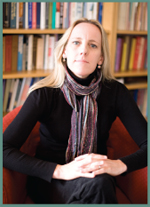Health and Humanism

A decade ago my family had a landlord named Shirley—she was, as they say, a real character. We lived in the house she grew up in, that her father had built in San Rafael, California. There were fruit trees in the backyard—apple, loquat, two peach, and a wildly prolific orange tree we’d raid for her. She liked us, she said, because we kept her in oranges.
“Nobody’s hurt, and nobody’s dying,” Shirley used to say when something went wrong. She liked us because we understood. She’d experienced hardship—who hasn’t? At any given moment if nobody was sick and nobody was dying, in Shirley’s infinite wisdom, things were okay.
It’s not okay right now. So many are sick with COVID-19. People are dying. ALL OVER THE WORLD. And while a majority who are exposed to the virus won’t have severe symptoms, reading about the suffering of people hospitalized with COVID-19—some gone in a matter of days or weeks after falling ill, never saying goodbye to loved ones and dying alone—is heartbreaking. The toil of our brave medical professionals is absolutely heroic.
In a March 26 Wall Street Journal op-ed Robert Nicholson asks: “Could a plague of biblical proportions be America’s best hope for religious revival?” concluding that “Great struggle can produce great clarity.” A counterpoint to his clarity lies in the examples of preachers, albeit a minority, whose insistence on holding services with large numbers of people in close proximity is dangerously delusional. “If you cannot be safe in church, you’re in serious trouble,” said the Rev. Rodney Howard-Browne of the River of Tampa Bay Church in Florida. He was arrested March 30 for repeatedly ignoring county sheriffs’ demands to keep his flock away. Noting that his church was “raising up revivalists, not pansies,” the reverend had vowed not to close the doors of his church until the rapture had taken place, claiming the coronavirus was a sinister plot by the World Health Organization. Another man of God in Indio, California, claimed that scripture commanded him “to lay hands on people and pray for them,” including the sick.
I think we all agree there’s a much healthier approach to this health crisis, one that relies on science, medicine, and reasonable human compassion. Reading commentary on the coronavirus pandemic, the concept of “health equity” has emerged as a primary concern. Or rather, the lack of health equity such a crisis reveals. In theory, health equity would mean that all people living under a certain government, be it local, state, or federal, would have the same opportunities to stay healthy. Reports of how the elderly, the poor, and people of color are disproportionately felled by the coronavirus illuminate the pervasive inequity in our society. We must address this.
Another aspect of the crisis that confounds me is the lack of testing. Of course, testing isn’t a cure, but it would compel more people to self-isolate and minimize the spread of the disease. Way back on March 9, Vice President Mike Pence said: “we literally are going to see a dramatic increase in the availability of testing, and that’s all a direct result of the president’s leadership.” No. In fact, the continued lack of testing is a direct result of his leadership. It is an outrage.
One coping mechanism during hardship is to channel gratitude for what you have—not to feel good that someone else has it worse but to stave off dread and channel your concern and action toward others. In Albert Camus’s 1947 novel The Plague, the character Jean Tarrou organizes teams of volunteers to fight a plague that overtakes a French Algerian city, concluding: “All I maintain is that on this earth there are pestilences and there are victims, and it’s up to us, so far as possible, not to join forces with the pestilences.”
It’s a real balancing act—trying to process what’s happening and what it all means while appreciating the good and not succumbing to fear, guilt, and rage. Considering plagues of old and the Great Depression, about what people were able to endure, albeit with great loss, and the humanity that came out of it—not just in terms of social action but in music, literature, and art—has been a salve for me. (Speaking of Camus, the absurdist in me keeps channeling “Life During Wartime” by The Talking Heads: I’ve got some groceries, some peanut butter/To last a couple of days… This ain’t no party, this ain’t no disco/This ain’t no foolin’ around.)
I hope you also find the material herein to be a salve. This isn’t the first pestilence humanity has survived, and doing so will require a commitment to each other, to human flourishing, yes, but also to basic persistence. “God help us” is something people say when a situation has become so dire that only divine intervention could save it. When an atheist says it, it pretty much means we’re screwed. So I won’t say it. I’ll just say take care.
